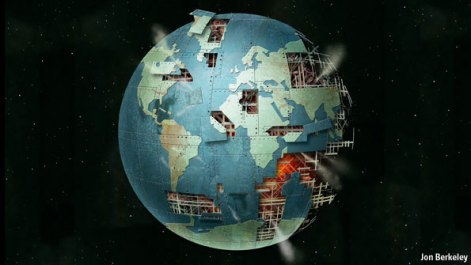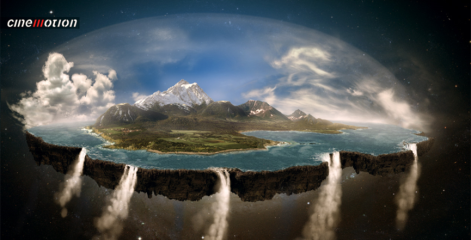From The Economist cover story of May 28, 2011:
“Humans have changed the way the world works.
Now they have to change the way they think about it, too.”

Human civilization evolved during a period of relatively stable climate over the last 10,000 years. With a rapidly developing and industrialized world, now at about 7 billion and headed for 9-10 billion, humans have become a significant driving force in changing the Earth. Here is an excerpt from the 5/28 cover story of The Economist magazine:
Humans have become a force of nature reshaping the planet on a geological scale—but at a far-faster-than-geological speed.
A single engineering project, the Syncrude mine in the Athabasca tar sands, involves moving 30 billion tonnes of earth—twice the amount of sediment that flows down all the rivers in the world in a year…
The carbon cycle (and the global warming debate) is part of this change. So too is the nitrogen cycle, which converts pure nitrogen from the air into useful chemicals, and which mankind has helped speed up by over 150%. They and a host of other previously natural processes have been interrupted, refashioned and, most of all, accelerated…
Scientists are increasingly using a new name for this new period. Rather than placing us still in the Holocene, a peculiarly stable era that began only around 10,000 years ago, the geologists say we are already living in the Anthropocene: the age of man.

The Economist article (Briefing) concludes that there is no turning back and perhaps we will be best off embracing the future.
The growing availability of solar or nuclear energy over the coming centuries could mark the greatest new energy resource since the second of those planetary oxidations, 600m years ago—a change in the same class as the greatest the Earth system has ever seen. Dr Lenton (who is also one of the creators of the planetary-boundaries concept) and Dr Watson suggest that energy might be used to change the hydrologic cycle with massive desalination equipment, or to speed up the carbon cycle by drawing down atmospheric carbon dioxide, or to drive new recycling systems devoted to tin and copper and the many other metals as vital to industrial life as carbon and nitrogen are to living tissue.
Better to embrace the Anthropocene’s potential as a revolution in the way the Earth system works, they argue, than to try to retreat onto a low-impact path that runs the risk of global immiseration.
A Brief History of Human Understanding of the World
The World is Flat

The Earth is the Center of the Universe

The Earth is a Planet (in a Solar system in a Galaxy in the Universe)

The Earth’s Future is in Our Hands

Just as the average person (and even the ruling elites) initially resisted the earlier paradigm shifts, many of us, from the urban poor in the slums of Mumbai to the wealthiest of hedge fund managers on Wall Street, are too caught up in economic survival and advancement to see or care about the bigger picture. I am afraid that, until a much larger share of us come to know the world in this new way, human civilization will be unable able to really transition to a sustainable future…not sure what that will take. We don’t have the luxury or time as in earlier eras.






If there is an allien invasion, here are what they have achieved:
. Realizing that a planet has limited resources, but limitless population.
. A globalized society: resources and FREEDOM belongs to all and ALL is divided reasonably not equally , all alliens are FORCED to fight for the allien kind’s survival ( their only natural dictator ).
What’s up to all, how is all, I think every one is getting more from this web
site, and your views are fastidious designed for new viewers.